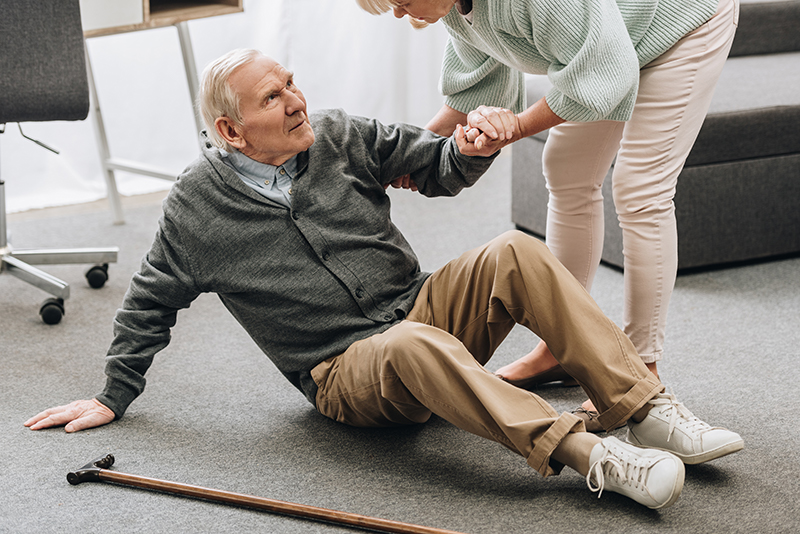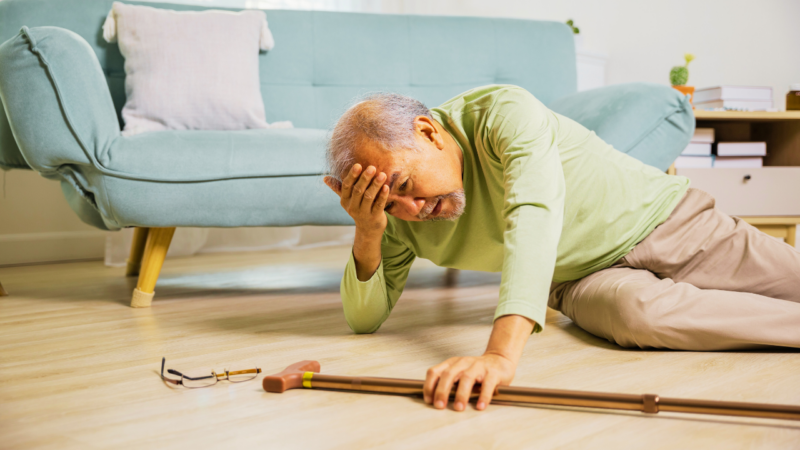So you’ve had a fall or have been told that you are at high risk of falling. What should you do now and what can help prevent falls?
Engaging in physiotherapy can be an effective way to stay safe and stay on your feet. Let’s discuss what is involved in the typical physiotherapy management of falls.
Physiotherapy for falls prevention aims to meet four essential goals. Let’s call these: (a) prevention and assessment, (b) avoiding a ‘long lie’, (c) environmental safety, and (d) restoration of confidence and quality of life.
Let’s unpack them …
(a) Prevention and assessment
Firstly, prevention. In medicine, the saying ‘an ounce of prevention is worth a pound of cure’ holds true here. Older people should be routinely asked about their falls history and any near-misses. This enables health professionals to identify people at high risk and help to put falls prevention strategies in place.
To ascertain the most likely cause of a future fall, and to detail the cause of a previous fall, a thorough physiotherapy assessment is required.
A typical physiotherapy assessment will include:
- A detailed subjective assessment: This is a discussion to obtain as much relevant information as possible to help us come up with the right plan.
- Gait analysis: We will check how well you’re walking and what problems you might have.
- Balance assessment: A few simple tests to check how good you are at staying on your feet.
- Joint movement and muscle strength assessment: We will ask you to perform some easy movements so we can get an idea of how your body moves and how this might affect your balance.
Physiotherapists are uniquely positioned to perform these in-depth falls assessments.
Routinely exercising and participating in age-specific falls prevention programs is also incredibly beneficial for balance and falls prevention.
Physiotherapists help seniors to develop a tailored exercise program focused on improving the areas where they most need assistance. This is arguably the most important step in fall prevention.

(b) Avoiding a ‘long lie’
Most of us don’t mind a long lie down on a sleepy Sunday afternoon, but a long lie on the ground after a fall is far from a good thing.
A ‘long lie’ is typically when someone is on the floor for over an hour and has been unable to get up. A long lie can lead to many complications, including muscle or skin damage, dehydration and pneumonia.
Many older adults fear or struggle with the question, ‘How do I get up after a fall?’
Part of the management of falls prevention is to check if older people are able to get up off the floor after a fall or have a strategy to get help if they fall and are unable to rise.
Physios can teach specific techniques to rise from the floor to avoid the consequences of a ‘long lie’.
(c) Environmental safety
Risk management plays a major role in the prevention of falls.
Simple things such as removing clutter, rearranging furniture, being selective with seating, or removing or securing rugs can have a huge impact on preventing falls.
A physiotherapist will help to assess the home, identify risks and collaboratively develop strategies to eliminate or minimise the risks identified. In some cases, it may be appropriate to discuss the use of a gait aid to provide support and stability when on the move.
(d) Restoration of confidence and quality of life
Fear of falling is a common experience for many older people, even those who have not experienced a fall in the past.
Research shows that this can lead to “activity avoidance, loss of independence and reduced quality of life, and is associated with an increased risk of falling” (Source: Goodwin & Briggs, 2012).
This can sometimes have a greater effect on a person’s life than the fall itself and therefore should be considered in the development of a physiotherapy program. A common assessment here is a questionnaire asking whether the fear of falling has affected areas of a person’s life.
If it has impacted quality of life, a physio will work alongside you to safely get back to the activities you love.
There are several steps you can take immediately to help prevent falls including stretches designed specifically for seniors to improve flexibility, and building healthy exercise habits.
Falls are preventable and you don’t have to let it become a regular issue in your life. If you or members of your family have any questions about fall prevention, our friendly team of physiotherapists are here to help.
Contact us today on 1300 797 793 and speak with Nancy, Julia and Jess from the TPC Client Care team to discuss your situation. If they’re busy on other calls, leave a message and someone from the team will call you back for a chat! Alternatively you can email us via [email protected]

Reference: https://bacpar.csp.org.uk/system/files/agile_falls_guidelines_update_2012_1.pdf



 1300 797 793
1300 797 793